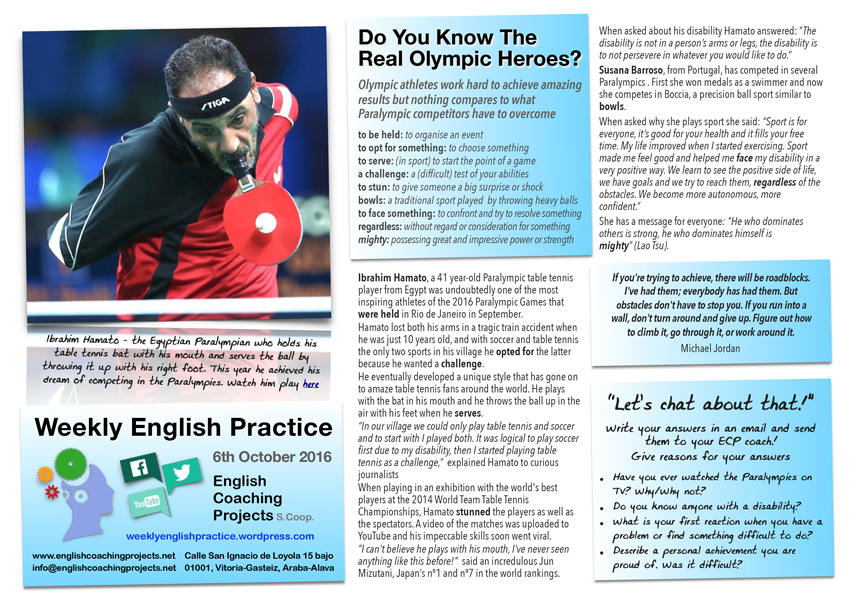Click on the image to download the pdf
Olympic athletes work hard to achieve amazing results but nothing compares to what Paralympic competitors have to overcome
Vocabulary. Read and check you understand this before you read and listen to the article:
to be held: to organise an event
to opt for something: to choose something
to serve: (in sport) to start the point of a game
a challenge: a (difficult) test of your abilities
to stun: to give someone a big surprise or shock
bowls: a traditional sport played by throwing heavy balls
to face something: to confront and try to resolve something
regardless: without regard or consideration for something
mighty: possessing great and impressive power or strength
[soundcloud url=”https://api.soundcloud.com/tracks/293664950″ params=”color=ff5500&auto_play=false&hide_related=false&show_comments=true&show_user=true&show_reposts=false” width=”100%” height=”166″ iframe=”true” /]
Ibrahim Hamato, a 41 year-old Paralympic table tennis player from Egypt was undoubtedly one of the most inspiring athletes of the 2016 Paralympic Games that were held in Rio de Janeiro in September.
Hamato lost both his arms in a tragic train accident when he was just 10 years old, and with soccer and table tennis the only two sports in his village he opted for the latter because he wanted a challenge.
He eventually developed a unique style that has gone on to amaze table tennis fans around the world. He plays with the bat in his mouth and he throws the ball up in the air with his feet when he serves.
“In our village we could only play table tennis and soccer and to start with I played both. It was logical to play soccer first due to my disability, then I started playing table tennis as a challenge,” explained Hamato to curious journalists
When playing in an exhibition with the world’s best players at the 2014 World Team Table Tennis Championships, Hamato stunned the players as well as the spectators. A video of the matches was uploaded to YouTube and his impeccable skills soon went viral.
”I can’t believe he plays with his mouth, I’ve never seen anything like this before!” said an incredulous Jun Mizutani, Japan’s nº1 and nº7 in the world rankings.
When asked about his disability Hamato answered: “The disability is not in a person’s arms or legs, the disability is to not persevere in whatever you would like to do.”
Susana Barroso, from Portugal, has competed in several Paralympics . First she won medals as a swimmer and now she competes in Boccia, a precision ball sport similar to bowls.
When asked why she plays sport she said: “Sport is for everyone, it’s good for your health and it fills your free time. My life improved when I started exercising. Sport made me feel good and helped me face my disability in a very positive way. We learn to see the positive side of life, we have goals and we try to reach them, regardless of the obstacles. We become more autonomous, more confident.”
She has a message for everyone: “He who dominates others is strong, he who dominates himself is mighty” (Lao Tsu).
“Let’s chat about that!”
Write your answers and send them by email to your ECP coach. Give reasons for your answers.
Why not record your voice too? Listen to yourself speak and identify what you have to improve on 🙂
- Have you ever watched the Paralympics on TV? Why/Why not?
- Do you know anyone with a disability?
- What is your first reaction when you have a problem or find something difficult to do?
- Describe a personal achievement you are proud of. Was it difficult?


